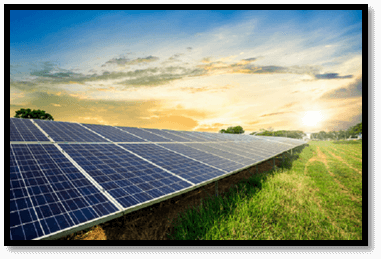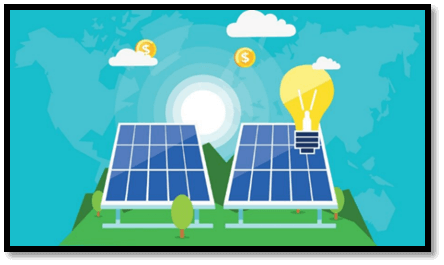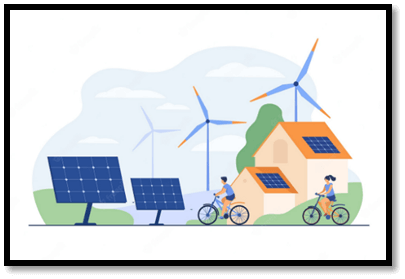Advantages and Disadvantages of Solar EnergySolar energy is really a revolutionary innovation that harnesses the sun's heat and radiant light for human use. It is an energy source that is clean and renewable and has the ability to produce electricity. The efficiency and expensive installation costs of solar energy have drawn criticism, yet it has also proven to be useful. It is an energy source that is clean and renewable and has the ability to produce electricity. It is an excellent way to reduce the overall environmental effect and prevent climate change. 
Reducing reliance on dangerous fossil fuels frees up scarce resources and assures that the planet will continue to be a safe place to live. But there are many things to understand when introducing solar power as a reliable energy source. The following are some benefits and drawbacks of the same: Advantages of Solar Energy1. Reliable energy source In comparison to traditional energy sources that rely on fossil fuels, solar energy has been a reliable energy source. Using solar energy, people are protected from utility company failures that could result from calamities or outages. Instead, you can generate your own electricity and become independent. Solar energy provides reliable production with little risk of failure. Solar energy will be available to us for as much as there is sunlight available, which, according to experts, will be at least 5 billion years from now. Solar energy technology (such as solar panels) does not have any moving parts, so it is not subject to wear and tear and makes no noise. The lifespan of solar panels is predicted to be greater than 30 years. 2. Economical way of energy generation The long-term economic benefits of solar energy are numerous. As the energy generated by the solar panel is used to power your home, you save expenses on your electricity bill. Solar panels have the ability to create more energy than they use, which could result in financial gain. Some governments provide homeowners with credits for the energy they generate and transfer energy into the economy. Solar energy requires a significant initial investment, but there are a number of tax subsidies and other incentive schemes that can help reduce those costs. Due to the ability to become energy independent and the rise in home value, the rate of return is also very valuable. 3. Maintenance cost is lower after the Installation The maintenance needed for solar energy systems is typically minimal. A few durations a year will be adequate as they only need to be maintained relatively clean. When in doubt, turn to specialized cleaning firms, which provide this service for between Rs. 2000 to Rs. 3000 per visit. The majority of trustworthy solar panel manufacturers provide a 20-25 year warranty. Moreover, as no mechanical components are involved, there is no depreciation. The only component that often has to be replaced after 5 to 10 years is the inverter because it continuously converts solar energy into power and heat. In addition to the inverter, maintenance is necessary for the cables in order to ensure that your photovoltaic panel's system runs as effectively as possible. This means that after investing in the solar system's original purchase, maintenance and repairs will likely cost you very little. 4. Renewable source of energy The biggest benefit of solar panels surpasses all others because solar energy is a 100% renewable energy source. It is present every day and can be used everywhere in the world. Unlike some other energy sources, solar energy will never run out. We will be able to access solar energy for as long as there is a sun. Solar power is a renewable energy source that is self-sufficient and just needs sunshine to function. It is unlimited and cannot run out, therefore, there will never be a shortage. 
5. Generates employment opportunities Economic opportunities have been produced by the development and acceptance of renewable energy sources like solar. Numerous individuals are employed by the solar energy sector in a variety of categories, including manufacture, construction, operation, installation, and maintenance. The economy generates green jobs as a result of solar energy, making it greener and more environmental friendly. 6. Reduced emission Burning fossil fuels releases carbon dioxide and other pollutants, which is a common method for producing conventional energy. The earth's carbon footprint can be greatly reduced by using solar energy, which is clean and emits few pollutants. Neither greenhouse gases nor pollution is produced by solar energy. For Example, When compared to other energy sources, solar energy has significantly less of an influence on the environment during the manufacture and production of solar panels. 7. Multiple purposes are fulfilled There are many uses for solar energy. Sun heaters are used in residential buildings to use solar energy to heat the water. Batteries provide energy throughout the day by storing solar energy. One of the ideal methods to reduce energy costs is to use solar equipment. In remote areas, energy from the sun can be used to generate electricity for buildings like schools, residences, clinics, and offices. In rural places, solar energy powers water pumps. Large-scale desalination facilities also employ solar energy in place of electricity. Public transportation systems, including trolleys, buses, and light trains, also run on solar energy. Offices, warehouses, and industries all use solar thermal energy as a source of power. Both radio and television stations are powered by solar energy. Additionally, it is utilized to power lighthouses and airplane warning lights. 
Disadvantages of Solar Energy1. Heavy expenses involved during the installation An initial solar system purchase carries a hefty price tag. Although solar energy is free, the initial expenses involved with collecting, processing, and conserving energy from the sun can be expensive. Investing in solar panels, batteries, an inverter, as well as wiring is necessary for the installation procedure and initial setup. Without accounting for tax breaks, batteries, or inverters, the average cost ranges from $15,000 to $20,000. Investing in solar energy has a number of benefits. However, the initial price is high, but it can be seen as an investment. The cost of solar energy is expected to decline in the future, though, as technology is always evolving. 2. Plenty of space is needed for the setup The quantity of area required for solar energy generation will depend on the number of power you intend to produce. You will be able to capture more light and energy if you have more panels or larger panels. Solar panels are typically installed in yards or on roofs. The number of panels you may put in and the amount of energy you can generate, however, may be based on the area of your roof. A different solution is to install parts of the panel in your yard, but they must have access to sunshine. Installing fewer panels can still meet certain of your energy requirements if you don't have enough area for all the solar panels you want. 3. Effectiveness of solar energy depends on weather conditions Solar energy needs to be available frequently and in plenty to be a great option. Climate and weather are uncontrollable environmental elements that affect solar energy. Solar panel power, for instance, can be reduced on cloudy or wet days. Solar energy is also influenced by latitude since it generates less energy at higher latitudes when the angle of the sun's radiation is smaller than at lower latitudes. Seasonal variations can affect the method's efficacy. If you live in a climate with seasons, for instance, more heat will be stored in the summers if there is more sunshine compared to winters when there is significantly less sunlight. The duration of the day, the environment, and the weather are important factors because solar energy cannot be collected at night. Thermodynamic panels, on the other hand, are a different option to think about if you also need your water heating system to operate at night or during the winter. 4. Solar Energy can cause pollution Solar energy systems can cause pollution, despite the fact that this pollution is significantly less than that caused by conventional energy sources. The generation of greenhouse gases has been linked to solar system installation and transportation. Solar systems are made using a variety of dangerous and poisonous components, some of which may have an indirect negative impact on the environment. However, compared to other alternative energy sources, solar energy produces a lot less pollution. 5. Conversion Rates are lower The use of solar energy is still a comparatively recent technological advancement. About 20-25% of solar energy is converted into electricity by even the most efficient solar panels. This does not, however, account for environmental conditions like clouds and rain. Conversion rates might potentially be lower during unfavourable weather conditions. Although this is not optimal, solar technology is constantly growing. This is expected to become better eventually.
Next TopicAdvantages and Disadvantages of Sports
|
 For Videos Join Our Youtube Channel: Join Now
For Videos Join Our Youtube Channel: Join Now
Feedback
- Send your Feedback to [email protected]
Help Others, Please Share










